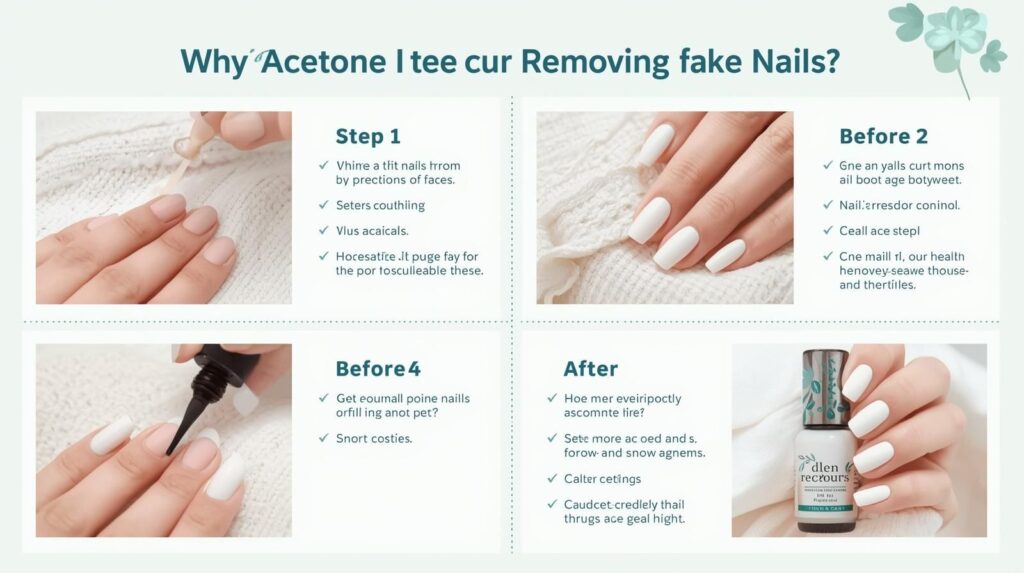Fake nails look beautiful but removing them the wrong way can damage your natural nails. That’s why many people use acetone to remove fake nails safely. Acetone to remove fake nails helps break the adhesive that holds fake nails making removal easier and less painful. Let’s understand how it works the right method and tips to protect your real nails.
Tired of peeling or pulling your fake nails and ending up with pain or damage? Discover the safe and easy way to remove them using acetone just like professionals do at salons but right at home.
Acetone is a strong chemical solvent that helps dissolve the glue or acrylic that bonds fake nails to natural nails. When you soak your nails in acetone it breaks the molecular structure of the adhesive allowing the artificial layer to loosen and lift off easily. It is a common and effective method used both at home and in salons.

People prefer acetone because it is quick affordable and easily available. It works for almost every type of fake nail acrylics gel extensions or press ons.
Unlike prying or pulling off fake nails which can cause bleeding or nail bed damage acetone offers a gentler way to dissolve the bonding material without hurting your natural nails.
Different fake nails require slightly different soaking times and techniques but acetone works for most of them.
Acetone softens acrylics in about 20–30 minutes making it easy to wipe or gently scrape them off.
Gel nails need a bit longer soaking because their coating is harder. The top layer should be filed first to help the acetone penetrate.
For press ons a short 10-minute acetone soak usually loosens the glue quickly without harming your nails.
Before using acetone to remove fake nails preparation is important. Trim the fake nails as short as possible using a nail clipper. Then file off the top layer of polish or gel to break the surface seal.
This helps acetone reach the glue or acrylic faster and work more effectively. Always start with clean dry nails for best results.
Here is the safe and easy method many salon professionals recommend for removing fake nails with acetone at home:
You will need pure acetone cotton balls aluminum foil a nail file and a cuticle stick.
Apply petroleum jelly around the cuticles and fingertips to prevent skin dryness or irritation from acetone.
Soak cotton balls in acetone and place them directly on top of each nail.
Wrap your fingertips with aluminum foil to keep the cotton in place. This traps heat helping acetone work faster.
Leave the wraps on for 20–30 minutes. Then check one nail if the fake nail lifts easily it is ready to come off.
Use a cuticle stick to gently push off the loosened fake nail. Never force it. Reapply acetone if needed.
When removing fake nails many people face problems like nail dryness rough texture or leftover adhesive. Sometimes impatience leads to pulling the fake nail before it is ready which can peel off layers of natural nail. Others use too much acetone or leave it on for too long causing burning or irritation. These mistakes can easily be avoided with care.
To avoid damage patience is key. Never rush the process. Use 100% pure acetone not diluted nail polish remover. Keep your fingers wrapped for the full duration and check gently. Moisturize your nails immediately afterward using cuticle oil or a thick cream. Avoid buffing your nails right after removal since they’re softer and sensitive at that stage.
If you have sensitive skin or dislike using chemicals there are safer alternatives though slower.
Soak nails in warm soapy water for 20–30 minutes. It can loosen fake nails mildly but may require several attempts.
These removers use ethyl acetate which is gentler but less powerful than acetone.
Massaging with oil can slowly weaken the adhesive and nourish the nail bed. Though it takes longer. It is safe and moisturizing.
After using acetone to remove fake nails your natural nails may feel dry and fragile. Follow these recovery tips:
Apply cuticle oil daily to bring back shine and flexibility.
Use a nail strengthener or a keratin based treatment for two weeks.
Give your nails time to breathe before applying any polish again.
Keep nails short to prevent peeling and breakage while they recover.
Using acetone to remove fake nails is effective but must be done carefully. Always follow the proper soaking steps and avoid shortcuts like prying or scraping.
A healthy removal routine not only saves your nails but also keeps your hands looking neat. If you often wear fake nails try giving your natural nails rest time between applications.
No. Regular removers contain less acetone and are designed for polishing not glue or acrylic. They may not dissolve fake nails properly.
Usually 20 to 30 minutes is enough. For thicker acrylics you may need a bit longer.
Prolonged contact can dry or irritate skin but short use with protection (like petroleum jelly) is safe.
No. Acetone damages the structure of fake nails making them unsuitable for reuse.
Try not to use it more than once every few weeks. Too much acetone exposure can weaken natural nails over time.
Using acetone to remove fake nails is a proven and safe method when done properly. It saves time prevents painful nail damage and keeps your natural nails healthy underneath. Always use pure acetone follow each step with care and moisturize afterward. Healthy removal habits make your nails stronger cleaner and ready for your next stylish look the right way.
